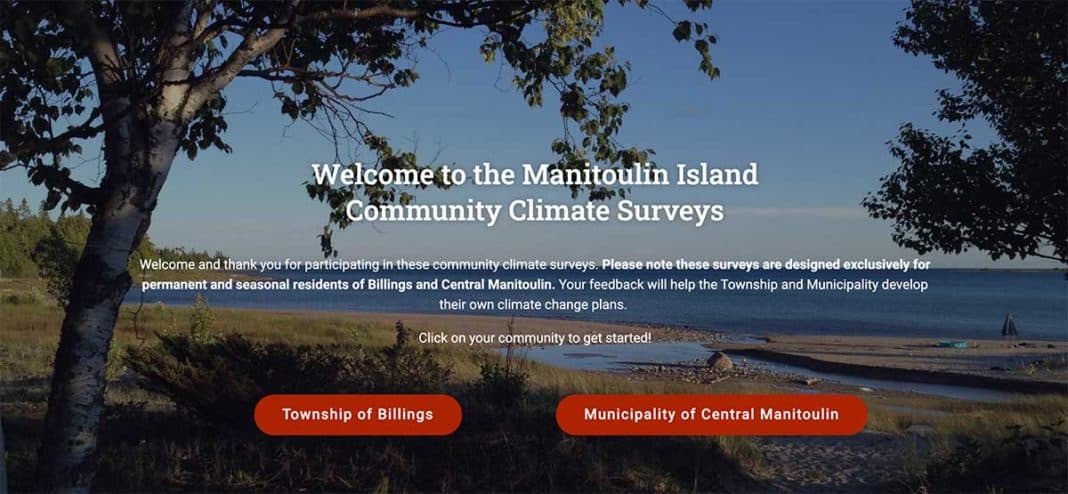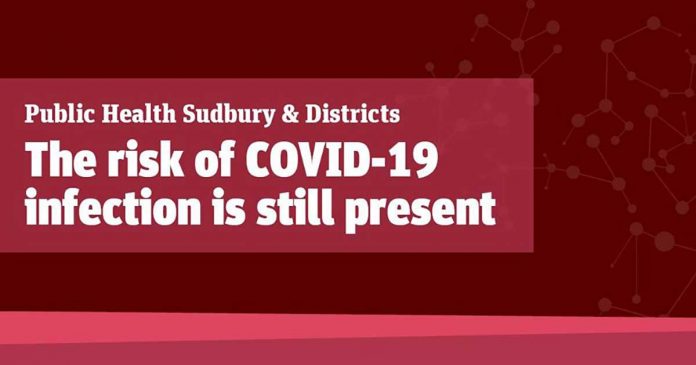KAGAWONG – Billings Township and Central Manitoulin are calling on all permanent or seasonal residents, non-resident property owners, business owners and farmers to help them understand community concerns regarding climate change. With COVID-19 restrictions, it was determined that an online survey was the best option for public engagement. Information gathered from participants will be used to help guide the municipalities’ climate change plans (Community Emissions and Energy Plan, or CEEP).
We live on an island in the middle of the Great Lakes in the northern hemisphere. Whether we like it or not, climate change is here, said Brian Barker, councillor/deputy mayor for Billings and Climate Action Committee chair. “We’re going to see some changes so the more we can be prepared, the faster we can move forward.”
The best currently available science tells us we can expect heavy precipitation to increase by 20 percent by 2030 and as Islanders, there is a higher flood risk from rising water levels and increased precipitation. Winds are expected to increase in strength and frequency by 18 percent over the same period. Winter temperature fluctuations will result in thinner ice and more freeze-thaw damage on our roads. We can also expect more extreme heat days (greater than 34°C), more frequent periods of drought and an increased risk of wildfires and resultant fire bans.
It makes sense from a risk management point of view for municipalities to consider all actions, including fixing all roads, improving trails and parks, electrifying vehicle fleets and sustainable new building or upgrading existing buildings to be energy efficient and net zero, but due to financial limitations, municipalities have to prioritize climate actions and make difficult choices.
“A climate change plan is never going to work unless we choose the actions that are most supported by the individuals who live here,” said Kim Neale, shared climate change co-ordinator for both Billings and Central Manitoulin. “That’s why it’s important for people to complete this. It’s tough to look at global, national and provincial plans and feel that we personally can’t do much to impact climate change, but with this local plan we can do a lot. It’s about getting involved and feeling invested locally in the actions.”
The survey was developed by Ms. Neale with guidance from local Climate Action Committees (CACs) and consultant Ethelo. The CACs are committees of council and consist of both elected officials and citizen members who are working with municipal staff to create a CEEP. Ms. Neale acknowledged the work of both Councillor Barker and his counterpart from Central Manitoulin, Dale Scott. “They’ve tried to consider all walks of life,” she said. “Throughout the whole planning process the committees have focused on getting feedback from residents from all different perspectives.”
Not all attitudes concerning climate change and climate change planning are the same across the board, said Ms. Neale. “There are people who are really dedicated to the cause of climate change and there are people who don’t consider it a major worry, and we recognize that. It’s really important for everybody, for and against, to complete the survey.”
Community engagement is important for all local government planning processes and it is built into the requirements of the funding received towards the climate change co-ordinator role. Given the constraints of the COVID-19 pandemic, the survey was determined to be the most suitable vehicle for gathering information. “In-person engagement is always better,” said Mr. Barker. “If nothing else, COVID has shown us that online meetings can be effective. It’s also a great way to meet our goal of reaching the greatest cross-section of participants. We wanted to engage permanent and seasonal residents as well as tourists and we wanted to reach across age groups and incomes. I think we’ve managed that with this survey.”
Lisa Lanktree is a Billings resident who has already completed the survey. “For it being the first engagement of its kind, I love it,” she said. “I think there was a lot of information … by the end of it I was wondering when it would be over. That being said, it provided actual relevant information.”
Ms. Lanktree is concerned about climate change and how it’s affecting the entire world. “I’m glad Billings is jumping on board and making an effort to educate people while giving them a chance to submit feedback, but I really don’t think the activities of this little township are going to make a difference in the bigger picture of climate change.” However, she felt the survey is important.
“One reason it’s important is that climate change is massive,” she said. “It’s going to affect us and if we’re not thinking about it and acting now we could be blindsided.”
If you take the time to read all the information provided as you proceed through the survey, it would take longer than the 10 or 15 minutes posted, said Ms. Neale. “If you want to read more, you can save it and come back to read more about options we’re considering for actions like composting or glass recycling. That’s the goal. The content that’s there will carry forward into the CEEP and also in some way to our websites so it’s readily accessible to our residents, post-survey.”
People may want a centralized composting facility and that’s an option on the survey, she said. “A report prepared by the waste management committee struck by the Manitoulin Municipal Association 10 years ago determined that a centralized composting facility was not going to be a viable investment for the municipalities collectively or for the individual communities. The costs have come down a lot but are people going to take the time to put their food waste aside to take it to the landfill a week later?”
Even the most-supported centralized composting program in the country only sees 25 percent participation. “That’s only 25 percent of the food waste truly being diverted from landfills. Composting at home might see an increase in that percentage but we could get an even higher participation rate if we provide our citizens with at-home composting solutions that are innovative and easier to use.”
There is a possibility that people might prefer an action but might not want to change their behaviour to make it work. “These aren’t necessarily going to take place immediately,” Ms. Neale explained.
She’s curious to see how people respond to the composting question, especially since there are two composters up for grabs as a raffle prize for participants. “I think it’s super easy to use this FoodCycler we’re giving away or even the outdoor barrel composter because it removes the labour of going out and turning your compost.
The FoodCycler is an odour-free indoor food recycler that claims to reduce your food waste by 50 percent, which diverts waste from the landfill and reduces methane gas production that results from the decomposition of food waste. Central Manitoulin municipal staff have been testing one out and by all accounts, are impressed with how easily and quickly it turns food waste into healthy, usable compost. One staffer has already decided to purchase one.
More than 120 respondents have completed the survey to date. With an estimated population of 10,000 (including permanent and seasonal residents) the goal is to have at least 300 participants; this will make the resulting data statistically viable. The survey is live now (visit climatesurvey.ca) and will be available until February 25. There is a telephone option as well, by calling 705-905-4406.
This climate action planning process does not end with the survey engagement, said Ms. Neale. With community input, the next step is to put the plan into action.





